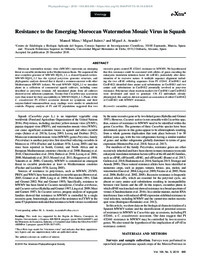Por favor, use este identificador para citar o enlazar este ítem:
https://hdl.handle.net/11000/30775Registro completo de metadatos
| Campo DC | Valor | Lengua/Idioma |
|---|---|---|
| dc.contributor.author | Miras, Manuel | - |
| dc.contributor.author | Juárez Gómez, Miguel | - |
| dc.contributor.author | Aranda, Miguel A. | - |
| dc.date.accessioned | 2024-01-26T13:12:13Z | - |
| dc.date.available | 2024-01-26T13:12:13Z | - |
| dc.date.created | 2018-12-20 | - |
| dc.identifier.citation | Phytopathology V.109, n. 5 mayo 2019 | es_ES |
| dc.identifier.issn | 0031-949X | - |
| dc.identifier.issn | 1943-7684 | - |
| dc.identifier.uri | https://hdl.handle.net/11000/30775 | - |
| dc.description.abstract | Moroccan watermelon mosaic virus (MWMV) represents an emerging threat to cucurbit production in the Mediterranean Basin. We sequenced the near complete genome of MWMV-SQ10_1.1, a cloned Spanish isolate. MWMV-SQ10_1.1 has the typical potyvirus genomic structure, and phylogenetic analysis showed that it shared a common ancestor with other Mediterranean MWMV isolates. We used MWMV SQ10_1.1 to inoculate plants in a collection of commercial squash cultivars, including some described as potyvirus resistant. All inoculated plants from all cultivars showed severe infection symptoms. Twenty-four Cucurbita spp. accessions were then tested for their susceptibility to MWMV-SQ10_1.1. Plants of the C. ecuadorensis PI 432441 accession showed no symptoms and their enzyme-linked immunosorbent assay readings were similar to uninfected controls. Progeny analysis of F1 and F2 populations suggested that two recessive genes control PI 432441 resistance to MWMV. We hypothesized that this resistance could be associated with alleles of genes encoding the eukaryotic translation initiation factor 4E (eIF4E), particularly after determination of its recessive nature. A multiple sequence alignment including the two eIF4E ortholog sequences from PI 432441 (CeeIF4E1 and CeeIF4E2) identified three amino acid substitutions in CeeIF4E1 and two amino acid substitutions in CeeIF4E2 potentially involved in potyvirus resistance. Polymerase chain reaction markers for CeeIF4E1 and CeeIF4E2 were developed and used to genotype 156 F2 individuals already phenotyped; this analysis did not support an association of either CeeIF4E2 or CeeIF4E1 with MWMV resistance | es_ES |
| dc.format | application/pdf | es_ES |
| dc.format.extent | 9 | es_ES |
| dc.language.iso | eng | es_ES |
| dc.publisher | The American Phytopathological Society | es_ES |
| dc.rights | info:eu-repo/semantics/openAccess | es_ES |
| dc.rights | Attribution-NonCommercial-NoDerivatives 4.0 Internacional | * |
| dc.rights.uri | http://creativecommons.org/licenses/by-nc-nd/4.0/ | * |
| dc.subject | Cucumber | es_ES |
| dc.subject | Pumpkin | es_ES |
| dc.title | Resistance to the Emerging Moroccan Watermelon Mosaic Virus in Squash | es_ES |
| dc.type | info:eu-repo/semantics/article | es_ES |
| dc.relation.publisherversion | https://doi.org/10.1094/PHYTO-10-18-0395-R | es_ES |

Ver/Abrir:
Resistance to the Emerging Moroccan Watermelon Mosaic Virus in Spain.pdf
2,16 MB
Adobe PDF
Compartir:
 La licencia se describe como: Atribución-NonComercial-NoDerivada 4.0 Internacional.
La licencia se describe como: Atribución-NonComercial-NoDerivada 4.0 Internacional.
.png)